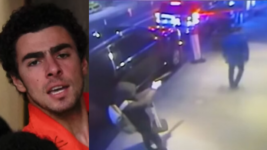Making a Hero of an Alleged Murderer: The Killing of United Healthcare CEO Brian Thompson

Video footage taken on 4th of December 2024 shows a hooded person emerge out from the shadows on a New York City street at night to shoot a man in the back of the head in front of a Manhattan hotel.
The video plays like a scene from a spy thriller, and allegedly captures Ivy League graduate Luigi Mangione murdering Brian Thompson, who was the CEO of the largest health insurer in the United States, United Healthcare Group.
Mr Mangione was arrested whilst allegedly in possession of a 3D-printed gun in the Pennsylvanian city of Altoona on 9 December 2024. Yet, by the time the 26-year-old from a wealthy Baltimore family was apprehended, Mangione had already been bestowed hero status by much of the population due to the stark injustices of the US health insurance industry.
The United States is notorious for its non-provision of public healthcare, as well as for the manner in which its health insurers overcharge clients and then repeatedly deny them coverage when they develop medical issues.
The announcement that investigators had found the words “delay” “deny” and “depose” engraved upon the bullets used to gun down the chief executive confirmed to the public what had already been suspected, which was that the killer was pushing back against the injustices of the US health insurance system in the commission of the crime.
‘Delay, deny and depose’ is a well-known slogan used to decry the numerous denials of the US health insurance industry.
In the immediate wake of the alleged murder offence, however, United States citizens turned to social media not to condemn the killing but to angrily denounce the industry that the CEO represented and numerous individuals shared their own stories of being denied health insurance coverage. And since he was taken into custody, Luigi has received widespread veneration.
Indeed, the turning of a CEO killer into a modern-day lethal Robin Hood appears to be a development that depends upon the present moment, as a recent survey found that young people consider other factors to be more chiefly at play in causing Thompson’s death than the actual killer himself, although a majority of the elderly consider Mangione bears principal responsibility.
Loading up charges
Despite having meticulously planned the murder over a number of months, Mangione was identified as a result of being captured on CCTV footage at the hostel where he’d stayed, when he lowered his face mask to flirt with a receptionist and then following the killing, the young man got in a New York City taxi and stared straight into the vehicle’s camera, with his mask on, and his photo was taken.
After the authorities widely distributed the image in respect of the person of interest and posted a $10,000 reward for information leading to his arrest, a McDonald’s employee at an Altoona outlet called the police on spotting Mangione sitting in the fast food restaurant. And the suspect was then transported from Pennsylvania and placed in the custody of the New York Police Department.
Following his detainment, Mangione has appeared in three different courts, which has seen him rack up 20 different charges, and he’s pleaded not guilty to all.
The state of Pennsylvania charged Luigi on 19 December, with forgery, carrying firearms without a licence, tampering with records, possessing an item used in a crime and providing false identification to police.
The US federal court then laid three charges against Mangione’s name later that same day, which bring into play the potential for the death penalty. The federal charges involve murder using a firearm, two counts of stalking and one further count of using a weapon equipped with a silencer.
Mangione then appeared in the New York Supreme Court on 23 December, to plead not guilty to eleven charges against his name, which include murder in the first degree and murder as an act of terrorism.
The charge of murder as an act of terrorism gives rise to the suggestion that Mangione killed in an attempt to encourage others to take similar action against the health insurance sector and it also confirms suggestions that US authorities are concerned that copycat crimes involving the assassinations of heads of industry may be forthcoming.
And the fact that supporters of Mangione are currently crowdfunding in order to finance his defence, with $200,000 having been raised by Christmas Eve, may further contribute to the paranoia around the idea of copycat incidents.
“Parasites had it coming”
“To the Feds, I’ll keep this short, because I do respect what you do for our country,” Mangione’s alleged manifesto reads. “To save you a lengthy investigation, I state plainly that I wasn’t working with anyone.”
Mangione then apologises for any “trauma” he might have caused, however, the killing “had to be done”, he continues, because “these parasites simply had it coming”.
The alleged killer then outlines that the problematic state of the US healthcare system is underscored by the fact that it’s the world’s most expensive, yet life expectancy in the US comes in at 42nd worldwide.
The Ivy Leaguer then suggests that UnitedHealthcare is the largest company in the States, after Apple, Walmart and Google, however it’s not benefitting the health of US constituents but rather its turning an immense profit sourced from the American public.
“Obviously, the problem is more complex, but I do not have space, and frankly, I do not pretend to be the most qualified person to lay out the full argument,” Mangione further set out in his three-page document.
“But many have illuminated the corruption and greed… decades ago and the problems simply remain. It is not an issue of awareness at this point, but clearly power games at play.”
Sparking a nonviolent movement
YouTube station Channel 5 with Andrew Callaghan recently attended a rally for the release of Luigi Mangione at New York City’s Washington Square Park on 21 December, where demonstrators likened the young man to Martin Luther King Junior and Gandhi, and one individual shared his story of how the health insurance sector has failed him miserably.
The University of Chicago has conducted a survey which found that only four in ten young people said Mangione bears a “great deal” of the responsibility for the murder, while six in ten 30- to 59-year-olds consider the young man bears “a great deal” of the responsibility, and, in terms of those over 60, eight in ten consider Luigi is primarily to blame.
But while US authorities fear a spate of CEO murders, those on the left are discussing the potential for Mangione’s actions to spark a new nonviolent protest movement that targets corporates directly, rather than governments, which have long been progressing policies to deflect society’s grievances against the actions of corporations being laid at the feet of those responsible.







